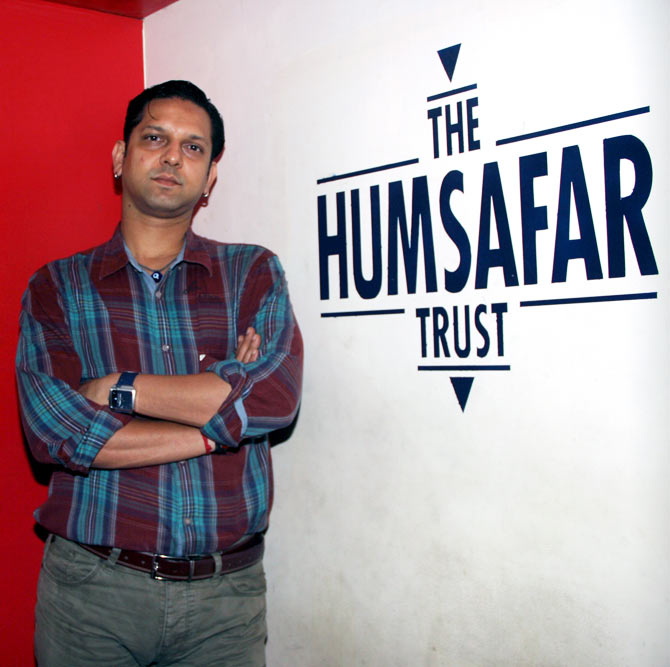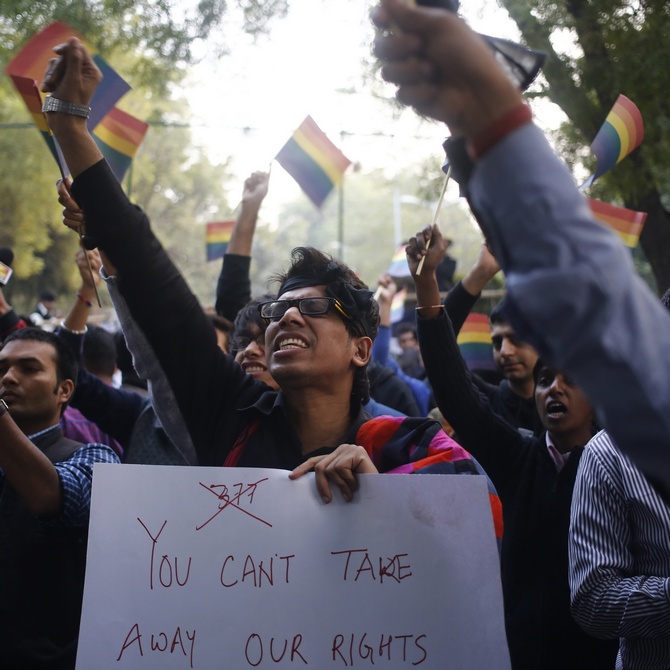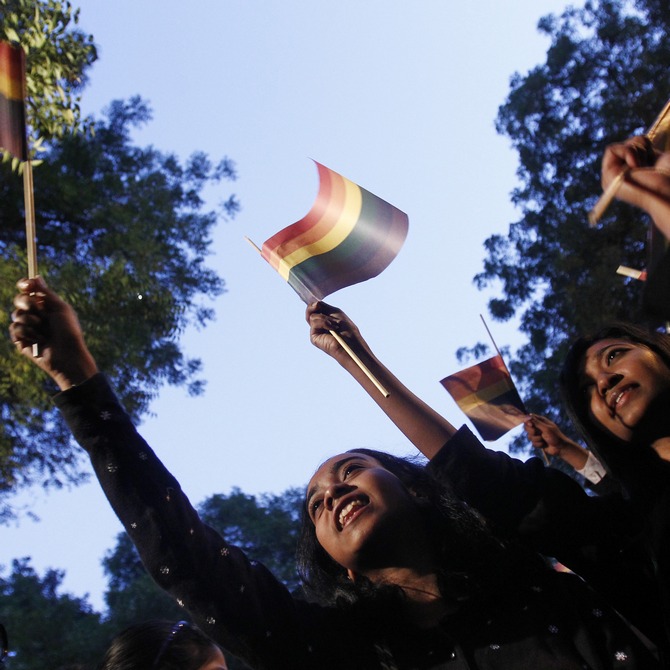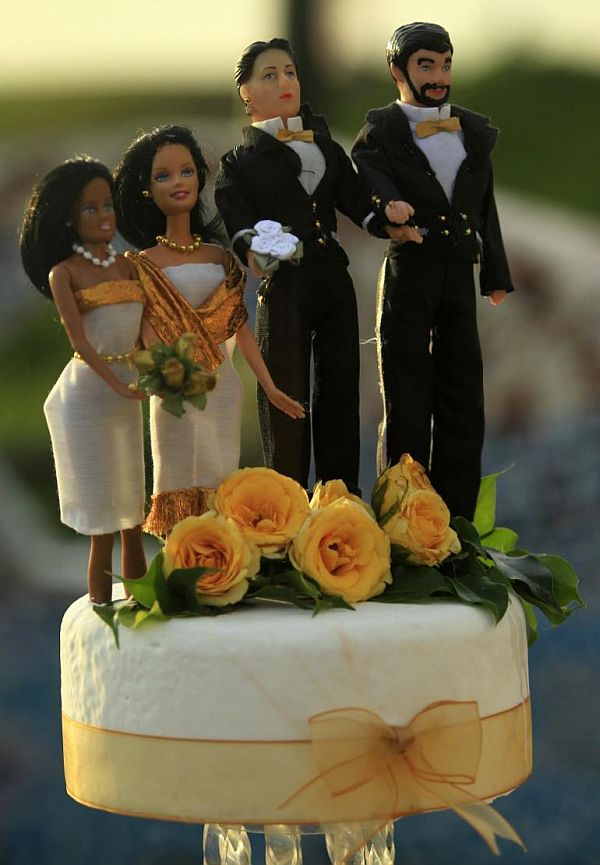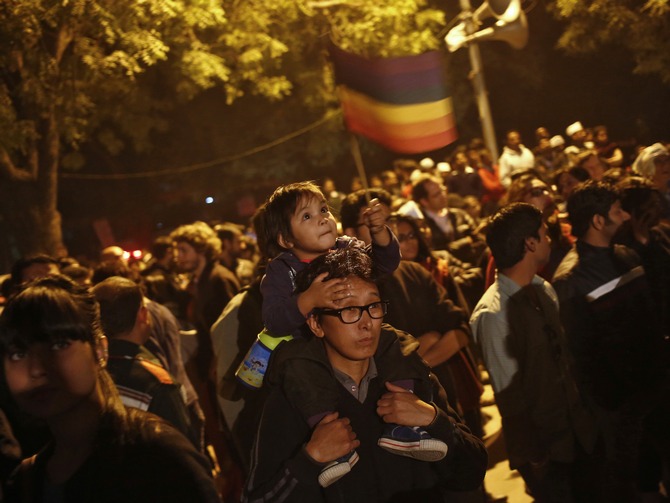 | « Back to article | Print this article |
Love in the time of Article 377
The Supreme Court may have effectively criminalised homosexuality, but maybe the best way to understanding differences is to know the lives affected by such a ruling.
So, this Valentine's Day, we bring you two stories of same-sex relationships.
Read them, and perhaps you might agree that love has no shade of grey.
'I too was given the impression that all gay men wanted to do was to have sex'
Pallav Patankar
When you are growing up and heterosexuality is the norm, you find yourself playing the game of pretence to fit in. Especially if you are a competitive child like I was.
It takes a long time and a lot of effort to come to terms with the fact that you can be good at whatever you do, and still be homosexual.
As a teen, I used to chase girls with Valentine's Day cards because that was what was expected of me. Alongside, I was also secretly sexually active with men.
I thought it was a phase that would go away once I would interact with girls. With this idea, I graduated from an all-boys school to a co-ed college where I made several female friends.
While they were as attached to me, as I was to them, there was no sexual attraction. I realised it was time I was honest to myself.
Once I accepted that I was gay, I also had to cope with the baggage of stereotypes. Questions -- like could I still be a doctor or an engineer if I am gay or would I have to be a make-up artist or a fashion designer -- began bothering me.
I was in a state of flux. My grades suffered and I lost a medical seat in Mumbai by just a few marks. That was when I decided to take charge of my life.
'One's sexuality need not come in the way of one's profession'
By now I was reading Bombay Dost magazine, where for the first time I was made aware of sexuality not in terms of the sexual act itself but in terms of its diversity and its possibilities.
The issues that were discussed -- related to finance, career and other aspects of life -- were issues that I had struggled to find answers to.
This was still the '90s. Mobile phones weren't still very popular. Bombay Dost did, however, have a post box number helpline. I wrote to them and they responded.
They used to have a mentor-mentee system where a senior person would introduce and guide the new member to socially acclimatise to the gay community.
I remember the first time I was introduced to a gay get-together I was surprised to see that it wasn't an orgy. Yes, like most others, I too was given the impression that all gay men wanted to do was to have sex.
I began attending more such events, met gay men who were doctors, engineers, architects, lawyers, and were pursuing their careers very successfully. My greatest learning during this time was the fact that one's sexuality need not come in the way of one's profession.
I began seeing other men and I realised that the dynamics of a homosexual relationship were the same as a heterosexual one. The only difference: I had to pass off my date as a friend to my mother.
My mother didn't care. For her, I was doing the 'guy thing' -- hanging out with guys.
Except that the 'guys' I 'hung out' with were some 10-15 years older than me. She'd ask where I'd met them.
In Mumbai, we have the concept of 'train friends' -- people you meet during your commute in local trains. And that was how I would introduce my partners: train friends.
The great part about living in a city like Mumbai is that you can be who you are and not give a damn about what others think.
I studied at St Xavier's College, which respected one's individuality. It gave you the kind of freedom few other places did. In retrospect, not getting the medical seat was a good thing because I'd be cloistered in that line.
I then did my master's in biotech from Madurai's Kamraj University. It lasted for two years and it was a blast.
By now, I had 'come out' to my mother and my sister (I had lost my father when I was much younger) and I began afresh in Madurai.
In my second year I found myself falling madly and deeply in love with someone a year junior. We got talking and occasionally I would flirt with him, dropping broad hints that I was interested in him.
Once while we were discussing our favourite movie stars, I mentioned that I also like male movie stars. He seemed intrigued and began visiting me more often.
We got intimate once, and suddenly I felt guilty. He said he was scared he'd lose me to a woman.
But we were in love. And for the time we were on the campus, we had the most amazing time. It was an intense relationship that continued for four years.
He would come to stay with me in Mumbai. My mother and he got along too.
Then I moved to Mumbai where I worked for some time and then began pursuing a management degree in international business. He was pursuing his management degree too in another city, and as it usually happens, the distance was taking its toll on our relationship.
We realised we needed to give each other some space. There was too much possessiveness and we needed a cool-down time.
After four years of being together, we decided to go our separate ways. There was no fight or argument. Soon after, I left the country and my job took me to Africa. We kept in touch but for seven years while I was travelling, we never met.
I returned to Chennai (where he lives) because I got posted there, and we met again.
He was about to get married, and he didn't know how to bring it up. He invited me to his wedding. I politely turned down the invite. It wasn't acrimonious; it wasn't bitter. I was happy with the fact that he, like me, had moved on.
It has been the only meaningful relationship I've had so far.
Meanwhile, I quit my corporate job and moved into the development sector. I am now the director of the HIV programme at the Humsafar Trust, an organisation for LGBT persons in Mumbai.
I am not in the mental space to see romantic love around me and I am alright with that. The romantic love that I lack in life is more than compensated by the love I receive from my colleagues, friends and family.
'My guilt weighed me down'
Chirag Yadav* shares his story
I remember the date. I remember the words. I remember those five seconds of deafening silence that seemed like a lifetime.
February 3, 2012, I finally told my parents: "I am homosexual. I am gay, so I don't want to get married."
Neither of my parents knew what to say. Then my mother started crying, and my father asked me how I knew.
Almost all gay persons get asked this. The thing is we just know. Just like you know you're straight, we know we're gay.
I was in class 8, when I began noticing guys being attracted to girls and vice versa. I was attracted to guys.
But for years after that I continued to pretend I was straight. There was no one I could talk to about what I was going through. Even my best friend didn't know until a few years ago.
During this time, I would keep talking to myself. It was as if there was another personality inside of me who knew what I was going through and patiently heard me out.
But for the larger part of 10 years, I never talked it out loud.
There was even one time during 2008, when I went out with a girl. We were in a relationship for a good six months; we talked for hours; we were fond of each other; we connected emotionally and had a comfortable relationship. But there was no physical attraction.
It wasn't long before I began to feel guilty of stringing her along. I stopped talking to her and I couldn't tell her why. For two years we were in a sometimes-on-sometimes-off relationship.
I felt terrible about not being able to tell her the truth. It was messed up. Eventually I never did and moved from Jaipur (where I was born and raised) to New Delhi to work for an NGO.
I was employed and all my friends were getting married. The question of my marriage came up too.
Proposals began to trickle in, my father began making plans.
Not knowing better, I played along for a while. But I also couldn't stand the thought of cheating another girl. My guilt weighed me down.
'Fear of being ridiculed had always prevented me from telling the people around me'
Most of 2010 passed like that till a young lady joined the NGO I was then employed with. She had worked with LGBT groups and it didn't take her long to figure out I was gay. But she never brought it up.
The fear of being ridiculed had always prevented me from telling the people around me. Yet there was something reassuring about her that made me want to finally come out to her, even though I hadn't known her for too long.
Once while we were hanging out, I finally told her I was gay and all she said was: "Yeah. I know."
I thought to myself: That was it?!
This was a burden I had been carrying all my life and I thought there would be some drama when I told someone about it. But this girl, who I barely knew, didn't make a big deal out of it at all.
That made all the difference.
All the memories, all the stories came tumbling out. For the first time in over 20 years I had finally said it aloud. The relief was indescribable.
Encouraged by her response, I came out to my best friend. His reaction was the exact opposite. He was shocked. For a week after I told him, we didn't speak.
At the end of the week -- it was a Saturday, I remember -- I called him up.
This time we spoke properly. I made him understand that nothing had changed between us. I told him that I took a very long time to come to terms with this fact and that he will probably need some time too.
He was alright, I suppose, with the fact that I was gay. What worried him was my future and what society would say.
I explained to him that it was possible to live with a man, to adopt a child.
Yet, to this day, he is worried.
He isn't sure whether his wife will accept me or not and he hasn't told her to this day.
It was now my parents' turn to be shocked.
I struggled with the idea of confronting them. I was struggling. It was affecting my work. Finally, my boss called me over to her house and we talked. It was the first time I told her I was gay too and told her of my insecurities.
She encouraged me to tell my parents the truth and before long I was on my way to Jaipur.
'I broke down. My father had finally understood'
After the initial shock, my parents started looking around for a 'cure'. One of the doctors they consulted suggested they could consult 'any endocrinologist'.
By now I was back in New Delhi. My father and I would exchange emails. I would send them stories that would explain that being homosexual wasn't a disease. He would send me links to various 'cures'.
Then one day I was summoned to Jaipur to be 'cured' of my homosexuality. My first reaction was to resist but I realised it wouldn't help my cause, so I went along.
The doctor, who my family and I knew, took me aside and explained that he knew very well it wasn't a disease but that I should consider societal reaction and relent.
I explained to him that society wasn't going to take care of my parents; I would, if it came to it, and that they should understand that.
He explained the situation to my father -- my mother was at home -- and asked him to make peace with who I was.
My father remained unconvinced. My mother was heartbroken that there was no cure. A domestic help was around. My mother asked us to keep our voices low.
Irritated, and perhaps on an impulse, my father said something that gave me a great sense of relief and reassurance.
He said he didn't care if I was gay or straight and that I was his son and that's all that mattered.
I broke down. My father had finally understood.
Through all this, I was in a relationship with someone from Chandigarh. We were together for a year; he was very supportive during my coming out phase. But things weren't working out between us and we called it off.
In June 2012, I met Anant (name changed) through a common friend. We began talking over the phone and I got the feeling he liked me.
We would wait for office to get over and during the hour long commute home, we would talk over the phone.
We went through the same phases heterosexual couples do -- possessiveness, insecurity, struggling with a long-distance relationship.
It would be four months before we would even meet -- in Goa on October 5, 2012.
We spent 2-3 days together; talking, walking on the beach. It was magical. We've been together since then.
He too has had his downs. His parents discovered he was gay quite by accident when they walked in on him in his apartment in Hyderabad where he used to work then.
He's moved back to Mumbai where they live but the family has never talked of that episode.
Besides travelling, we share very few things in common but Anant is a very positive person. He is very understanding and trustworthy.
I've moved to Mumbai to be closer to him but now I have a job that needs me to work in shifts so meeting becomes a little difficult. We meet as often as we can, clandestinely.
Like every other couple we fight, we make up. He's introduced me to his parents but as a friend, as part of a larger group, never as his boyfriend.
Perhaps they suspect we are in a relationship but they haven't brought it up and we haven't either. It seems like a fair arrangement for now.
I trust Anant to do what is right. He has always been a friend first and boyfriend later. And that has made all the difference.
As told to Abhishek Mande Bhot
